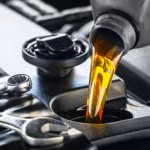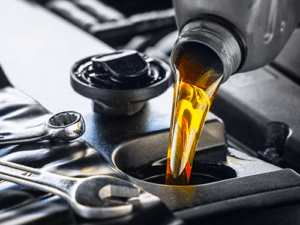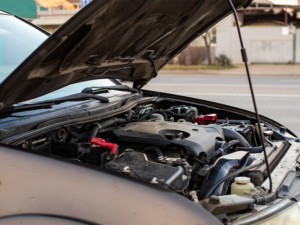
When it comes to keeping your vehicle safe and reliable, your brake system is invaluable. We understand that many drivers put off brake maintenance for as long as they can due to cost and time—but waiting too long can put you and others on the road at serious risk. That is why it is important to pay attention to how your car sounds, drives, and performs, so that if something starts to go wrong, you can take action and get the matter addressed.
Squealing when you brake, a vibration in your steering wheel, and having to compress your brake pedal more than normal can all be signs of an issue with your car’s brake system. Here at Owens 30 North Auto Repair, we want to ensure you are well-informed about your car and brake system. Understanding the warning signs of brake trouble and knowing when to seek professional help can make all the difference between a smooth drive and a dangerous situation. Below, we have outlined what to look out for and when to bring your car in for brake services.
Why Timely Brake Maintenance Matters
Your braking system is designed to handle intense pressure and repeated use, but it isn’t indestructible. Over time, brake pads wear down, rotors can warp, and fluid levels may drop, all of which reduce stopping power. Delaying service can lead to inefficient braking, more expensive repairs, and, in worst cases, brake failure. At Owens 30 North Auto Repair, our team sees this issue more often than you’d expect, especially when drivers assume squeaks or grinding noises will “go away.”
Proper brake maintenance isn’t just about avoiding costly repairs—it’s about protecting lives. A well-maintained braking system ensures that your car responds quickly in emergencies, giving you the ability to handle sudden stops safely.
Common Warning Signs That Your Brakes Need Attention
Recognizing the early signs of brake trouble can save you money and prevent accidents. By learning what to look out for and what certain sounds and vibrations could mean, you will be able to make informed decisions promptly. That’s why we have broken down some of the most common warning signs for you:
Squealing Noise from Your Brakes
It has probably already happened to you before. You are driving down the road, go to apply your brakes, and are met with a high-pitched squealing noise as your brakes work to slow your car down. Most modern brake pads are designed to include a small metal tab that makes contact with your wheel’s rotor once the brake material has worn down to a certain point, producing that unmistakable squealing. Once you begin hearing this noise, it is time to find a trustworthy mechanic shop and schedule an appointment for brake pad replacement.
While there may still be some brake material left even once the indicator starts making noise, it is best not to wait to replace them. Continuing to drive on worn pads decreases your brake system’s stopping power and will eventually lead to your car’s rotors warping, creating a significantly more costly repair. Keep in mind that while the vast majority of modern car brake pads include wear indicators, there are some older cars with brake pads that lack this simple yet effective alert feature.
Grinding Noise When Braking
If you begin hearing a grinding noise when you go to brake, this often indicates that your brake pads have little to no brake material left on them and are now making metal-on-metal contact with your rotors. This issue requires expeditious repair to prevent irreparable damage to your rotors. If promptly addressed, you can often just have new brake pads installed on your car and call it a day. But if the issue is allowed to go unaddressed and your rotors become warped and significantly damaged, they will need to be replaced along with your pads, potentially doubling your repair costs.
Vibration in Your Steering Wheel
If you feel your steering wheel vibrating, shaking, or pulsing whenever you hit the brakes, it’s a red flag that something is wrong. This sensation is usually another indicator of warped rotors that are making inconsistent contact with your brake pads. While you might be tempted to ignore it if your car still stops, the problem will only worsen. Over time, the uneven surface can damage other brake components, increase wear on your tires, and compromise your ability to stop smoothly. The sooner you have a mechanic inspect and resurface or replace the rotors, the sooner you’ll restore both your comfort and safety on the road.
Vehicle Taking Longer to Stop
When your car starts requiring more distance to come to a complete stop, you’re experiencing one of the most critical warning signs of brake trouble. This issue could stem from several causes, such as thinning brake pads that can no longer generate enough friction, low brake fluid levels reducing hydraulic pressure, or worn rotors that can’t grip effectively. Whatever the cause, a delayed stopping response is a major safety concern. On the highway, this could mean the difference between avoiding a collision and causing one. Driving with this issue puts extra stress on your braking system and can lead to a chain reaction of wear and tear. If you notice your stopping distance increasing—even slightly—schedule a brake inspection immediately to prevent a minor issue from becoming a dangerous one.
Unresponsive Brake Pedal
An unresponsive or “soft” brake pedal is one of the most alarming brake-related issues you can experience. If your pedal feels spongy under your foot, sinks to the floor, or requires extra force to engage, it’s a sign that your braking system is losing core function. Common causes include air bubbles in the brake lines (which disrupt hydraulic pressure), a leak in the brake fluid system, or a failing master cylinder—the heart of your braking system. Any of these problems can lead to a dangerous loss of stopping power. If your brake pedal isn’t behaving normally, do not continue driving unless absolutely necessary—have the vehicle inspected by a professional immediately to identify and fix the problem before it jeopardizes your safety.
The Role of Brake Fluid in Safe Driving
Many drivers don’t realize that brake fluid is just as important as pads and rotors. Over time, brake fluid can absorb moisture, reducing its effectiveness and leading to corrosion in your brake system. If you’ve noticed that your brakes feel less responsive than usual, old or contaminated fluid may be the cause, and it is serious enough to get your car to a trustworthy auto mechanic shop as soon as possible.
Quickly addressing potential issues with your brake fluid ensures that the root cause is identified and remedied before it turns into a bigger concern. But even if you aren’t experiencing any warning signs of brake fluid issues, regular brake fluid checks and flushes can preserve your brake system’s full stopping power and protect critical components from damage. It is recommended that you have your fluid levels checked during every routine maintenance visit to prevent hidden issues from compromising your safety.
How Driving Habits Affect Brake Wear
Not all brakes wear down at the same rate. Your driving habits play a major role in how long your brakes last. City drivers who frequently stop and start at lights and intersections will typically wear out pads faster than those who primarily drive on highways. Likewise, drivers who tend to brake hard and late may need brake pad replacements more often than those who slow down gradually.
Following a few best practices when it comes to braking can extend the life of your pads, giving you more usage time and minimizing the amount of money you spend on replacements. Implement these safe driving practices:
- Maintain a safe following distance to reduce sudden stops
- Downshift on steep hills to minimize strain on your braking system
- Avoid aggressive driving to minimize excessive braking
Why Professional Inspections Are Non-Negotiable
While you can keep an ear out for unusual sounds or notice when your car doesn’t feel quite right, some brake issues aren’t visible to the average driver. Concerns like uneven rotor wear or caliper problems may not show obvious symptoms until they’ve already affected your stopping power. That’s why regular professional inspections are critical.
Auto mechanics are trained to complete comprehensive brake evaluations that check each component of the system. During these inspections, damage and failures are identified and remedied with industry-standard repairs. Early warning signs can also be identified and addressed, preventing costly future repairs.
When to Schedule a Brake Check
So, how do you know when it’s time to book an appointment? A general rule of thumb is to have your brakes inspected at least once a year, or every 12,000 miles, whichever comes first. However, if you notice squealing, grinding, vibrating, or a soft brake pedal at any time, don’t wait—schedule service immediately.
It’s also wise to get your brakes checked before long road trips or after a harsh winter, since road salt and debris can speed up wear and corrosion. Preventative inspections like this help to keep your brake system functioning and avoid major system failures that could otherwise create unsafe driving situations.
Don’t Wait Until It’s Too Late
Brakes are not a part of your vehicle that you can afford to ignore. Recognizing early warning signs, understanding the role of each component in a braking system, and choosing the right auto repair shop are essential for your safety and your wallet. At Owens 30 North Auto Repair, we combine skilled technicians with state-of-the-art equipment to deliver reliable results every time you bring your car to us. Our customer-focused approach means we take the time to explain your options clearly, answer questions, and provide honest recommendations.
Our goal is to ensure that your vehicle remains in top shape and your braking system functions exactly as it’s meant to. That’s why we always encourage drivers to practice regular maintenance and take action when their car starts having problems. So if you’ve noticed unusual sounds, a change in pedal responsiveness, or simply haven’t had your brakes checked in a while, don’t wait. Contact Owens 30 North Auto Repair today to schedule your brake service and ensure your vehicle is road-ready.





